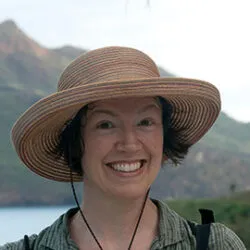Erin Bryant
Erin Bryant
Associate Professor of Ocean & Coastal Policy
B.A. Geology, Bryn Mawr College;
M.Ed. Education, Simmons College;
M.M.A. Marine Affairs, University of Rhode Island;
J.D. Roger Williams University School of Law
About
Research Areas & Interests
Ocean health and wealth; climate-change adaptation and mitigation strategies; marine renewable energy; coastal and ocean management; fisheries; ocean-related public health, ethics, and equity issues and solutions; and communication of science to non-scientists.
Teaching Philosophy
Notice, Care, Learn, Collaborate, Communicate, Plan, Test, Modify… these steps form a comprehensive student experience in ocean policy. In other words, observation, collaboration, questioning, and practice lead students to identify what is important and exciting to them, learn real examples of ocean science-and-policy dialectics, and draw connections among people and the value of places, ocean life and nonliving resources. College students can observe and ask questions about current ocean patterns, uses, threats, planning and cutting-edge marine management techniques, e.g.: what are some ways to increase sustainable energy practices to mitigate climate change; or waste management techniques to decrease ocean plastics pollution? Real interactions with experts, fine arts and performing arts, and field trips can illuminate and enliven threads in timely ocean policy topics such as: conservation; scientists in policymaking and law; coastal management, development, and resilience economics; and power generation. The Policy Cycle guides students to affect ocean health and wealth. E.g., ocean policy learning happens when students explore: 1) how to ethically and comprehensively gather information on a problem in a given place, 2) how to equitably communicate the issues to all relevant audiences, 3) how to design, implement and test strategies for better ocean-health and economic outcomes, or 4) how to modify and explain ocean management plans.
What would this ocean policy teaching look like in practice? How can students best build ocean policymaking skills? When students visit and investigate diverse ecosystems and human communities and collaborate with scholars and professionals, focusing on case studies related to students’ issues of interest, they acquire skills to work as professionals and with end users or stakeholders on their chosen issues. How can students assimilate ocean policy knowledge? Place-based case studies can identify how fundamental drivers of local, U.S., and international policy work together to address ocean health. The agendas of disparate stakeholders such as scientists, resource users and managers, policy makers, industry, property owners, strategists, and others influence the science-policy dialectic, marine environmental policy, international ocean law, communication of policy options, and politics and practices in a given region. Understanding history and people’s stories about the past enriches debates about ethics, justice, fairness, law, liberty, effective government, property rights, and good jobs, in order to bring us to wise management of resources.
Academic disciplines make the greatest impact when approached synergistically. Understanding how human activities from tourism to extractive industries affect systems can help students learn to manage ocean space effectively. Students can simultaneously consider ocean science with traditional ecological knowledge and experiential scholarly research methods (ranging from interviews to studies of human uses of ocean and coastal space) that build communication skills to propel them into the ocean policy careers and pursuits of their choice. It boils down to this: the best way to learn ocean policy is to see and try it!
Selected Publications
- Bryant, Erin, and Kristen M. Fletcher, “Exploring a New Strategy for Marine Protection: Private Conservation of Tidelands in Massachusetts,” Ocean and Coastal Law Journal Vol. 12, No. 1, 2006.
- Bryant, Erin, and Kimberly Hernandez. “The Best of Coastal Management 2015,” The Coastal Society Blog, March 2015.
- Global Marine Initiative, The Nature Conservancy, Inc., Co-author.
- Exploring a New Strategy for Marine Protection: an analysis of laws, policies, and practices related to private conservation of tidelands in Massachusetts. Leasing and Ownership in Ocean and Coastal Waters. 2007.
Wescott, Jeff, Richard King, and Erin Bryant. - “We Sail for Stories: 50 years of the blue humanities at Sea Education Association (SEA).” The Ocean, Blue Spaces and Outdoor Learning, edited by Mike Brown, Routledge, 2024, pp. 178-193.
Personal Interests
Swimming, cycling, boats, hiking, badminton, building birdhouses, group singing, mentorship programs, school gardening, field trips, family and friends.
